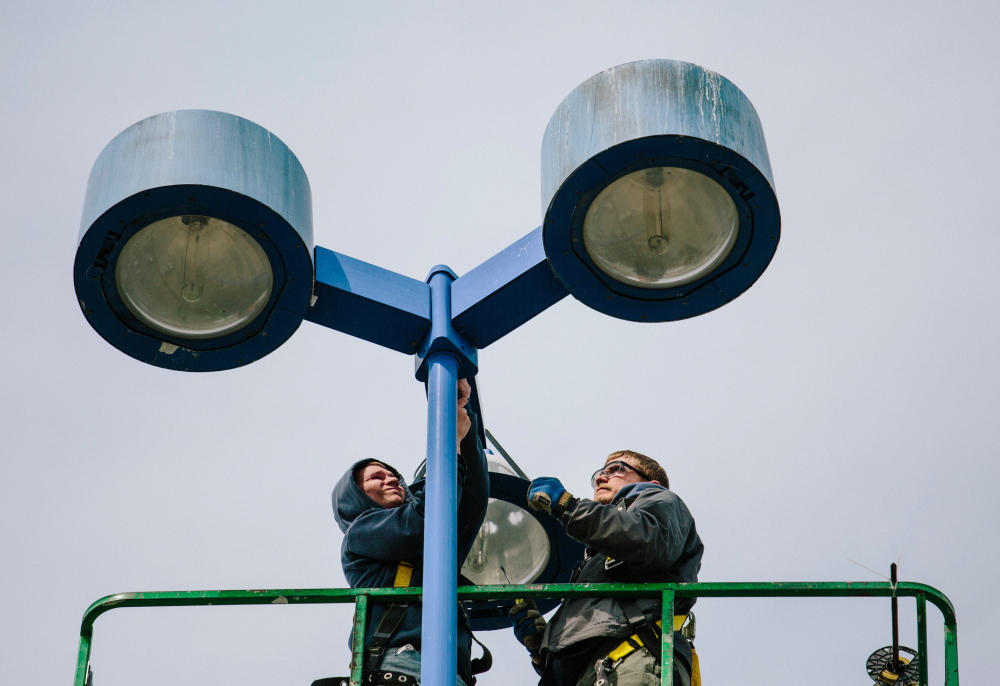The flood of interest in rebates for a business energy-savings program and a decision last month by state utility regulators that could cut funding for Efficiency Maine aren’t connected, but the timing of the two events is confusing and unfortunate, the agency’s executive director said Wednesday.
“These two things are unrelated,” said Michael Stoddard.
At issue is a March 17 ruling at the Maine Public Utilities Commission regarding the language of a landmark energy law passed in 2013. The omission of the word “and” in the law had the effect of cutting $38 million for Efficiency Maine’s budget, the PUC ruled. Since then, Democrats and Republicans have been at odds over how to fix the error, a battle that has generated extended news coverage.
During the same period, Efficiency Maine sent notices to its business partners that it was reducing the rebate levels for one part of its Business Incentive Program.
But the overlapping timing of the notices and media coverage of the PUC controversy may have led some business owners to conclude that this year’s Efficiency Maine programs are being cut back, Stoddard said.
According to Stoddard: The financing affected by the PUC ruling on the wording error won’t take effect until July 2016.
But the March notice kicked off an unexpected reaction. The agency received 1,600 requests in two weeks, worth more than $15 million in incentives. That was on top of $10 million already in the request pipeline.
The current rebate cut only involves lighting retrofits and is driven largely by the falling price of LED bulbs and fixtures. The business program has had similar rebate adjustments in the past; they just haven’t generated news coverage.
The cuts only involve the business program, not any residential programs.
“We’ve been talking to our board since January about reducing the rebate levels on LEDs,” Stoddard said. “We announced it in mid-March. When the PUC decision came out, some people jumped to the conclusion that (the $38 million cut) will take effect now. That’s not accurate.”
Efficiency Maine’s current annual budget is $77 million and goes to weatherization and conservation programs that include heating equipment, insulation and lighting. Projects done in the last fiscal year will save the equivalent of 22 million gallons of oil and 1.3 billion kilowatt hours over their life, the agency estimates. Taken together, those savings have an estimated value of $191 million.
The Business Incentive Program has a budget of $11 million. More than 90 percent of the money typically is spent installing more-efficient lighting. The reason is compelling. A 10-watt LED bulb can put out as much light as a 60-watt incandescent, for example, and last for many years.
The higher price of LEDs, however, has been an obstacle to switching out old-school bulbs. But over the last year or so, prices have been falling fast as more manufacturers put more LED options on the market. A typical two-by-four LED lamp common in offices, for instance, has gone from $300 to $110 or so.
That trend led Efficiency Maine to tell its business partners in a mid-March newsletter that incentives would be cut back.
The notice said projects submitted by March 31 that didn’t require pre-approval could qualify for the original, higher rebate. After that, incentive levels would fall an average of 25 percent, Stoddard said. Efficiency Maine qualifies more than two dozen lighting measures and offers various incentives. They range from $10 for a low-wattage lamp and ballast to $275 for a 80-watt LED canopy or parking garage fixture.
Reacting to the deluge, Efficiency Maine sent a follow-up notice April 3. It featured new guidelines that tightened up on the previous ones.
In the notice, Stoddard said: “While we understand that customers are frustrated and disappointed that incentive levels are reduced, Efficiency Maine adopted our approach to avoid the situation where a customer would purchase and install equipment before realizing that the incentives were lowered. The customers who filed for or received pre-approval after March 19, will receive full notice of the new, lower incentives so that they can decide if they still want to go ahead with the project, given the reality of the limited available budget.”
The changes haven’t been welcome by electrical contractors who work with businesses to switch out lighting.
Charles Haskell, president and owner of Seabee Electric in Scarborough, said he has submitted requests from 15 businesses over the past few weeks. In one instance, a company already has ordered equipment for new pole lights to be installed in June. In another case, Haskell said, the rebates for a lighting retrofit in an office-warehouse will probably fall from $13,500 to $6,000.
“Some of these businesses are going to be very upset,” he said. “I have to go back to my customers now and tell them I can’t follow through with what we believed was going to happen.”
Haskell has 35 employees. As a small businessman, he said he has worked in good faith with Efficiency Maine and is frustrated with the agency’s actions on the rebate issue, as well as the failure of lawmakers to quickly resolve the language error and its impact on funding.
“I’m very disappointed but not surprised that they’re playing with that up there like a political football,” he said.
Send questions/comments to the editors.





Success. Please wait for the page to reload. If the page does not reload within 5 seconds, please refresh the page.
Enter your email and password to access comments.
Hi, to comment on stories you must . This profile is in addition to your subscription and website login.
Already have a commenting profile? .
Invalid username/password.
Please check your email to confirm and complete your registration.
Only subscribers are eligible to post comments. Please subscribe or login first for digital access. Here’s why.
Use the form below to reset your password. When you've submitted your account email, we will send an email with a reset code.